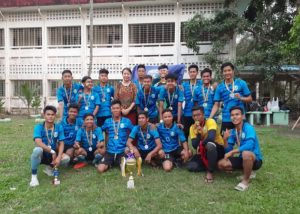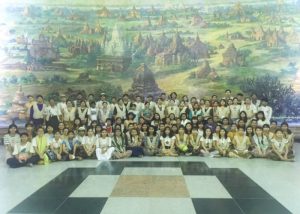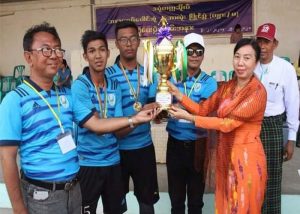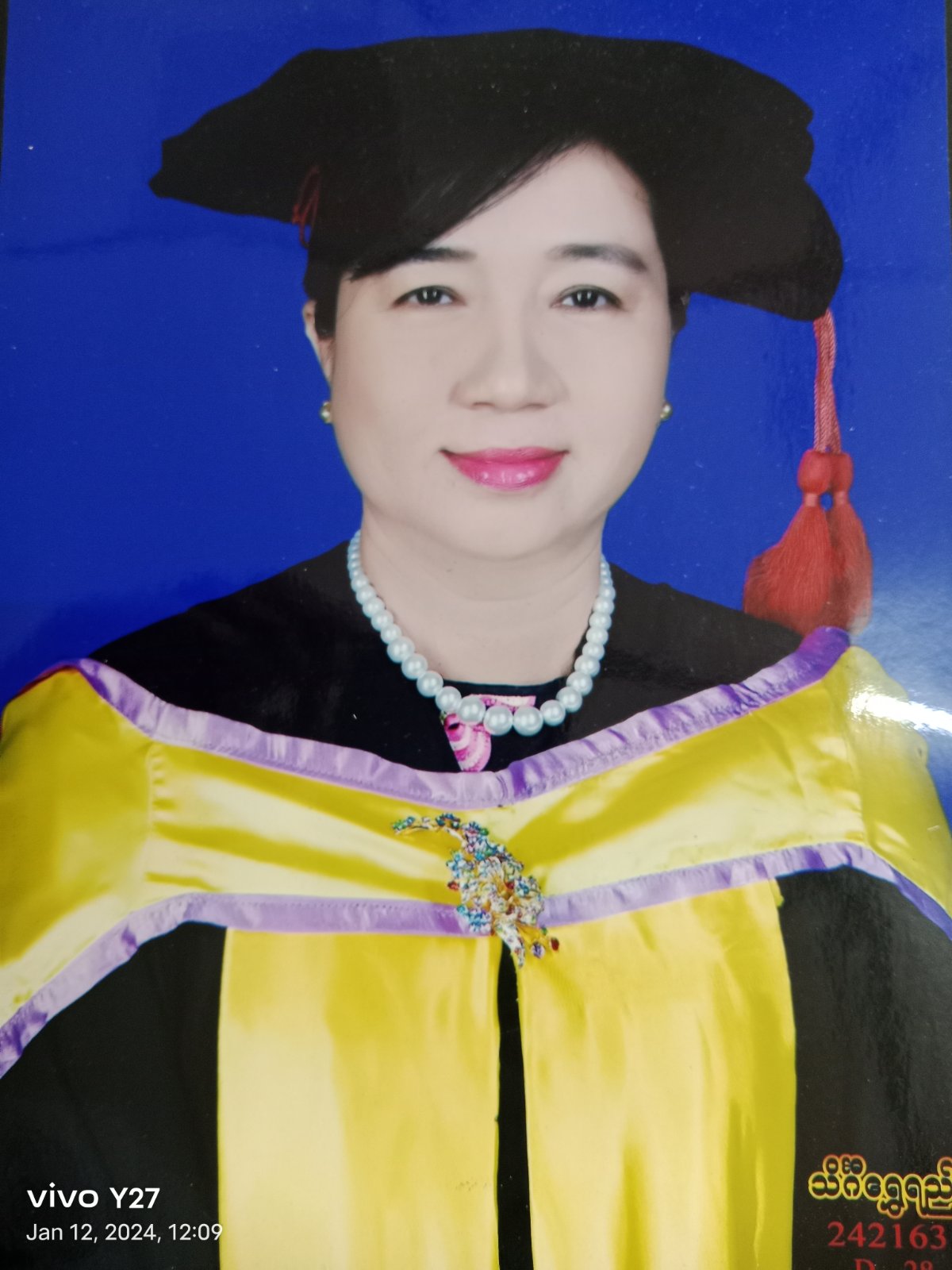
Dr. Phyu Su Aung
ဒေါက်တာဖြူစုအောင်
Position : Professor and Head
Degree : BA,BA(Hons;),M.A, Ph.D
History
Position : Professor Degree : BA,M.A, Ph.D
Teacher list
| Sr.No | Department | Name | Position | Education | Thesis Title | Field Of Specialization | Current Research Project | Email/Gmail |
| 1 | History | Dr.Phyu Su Aung | Professor(Head) | Ph.D | Political And Economic History Of Mergui (Myeik) District (1752-1885) | Politics and Economic | A Study On The History Of Buddhist Monastic Educational School in Mingaladon Township | [email protected] |
| 2 | History | Dr.Tin Myo Myint | Professor | Ph.D | The History Of Buddhist Associations in Yangon (1948-1988) | Social | [email protected] | |
| 3 | History | Dr.Aye Aye Thit | Associate professor | Ph.D | United Nations Activities Relating To Community Water Supply And Sanitation(1994-2004) |
Social | A Study On The History Of Buddhist Monastic Educational School in Mingaladon Township | [email protected] |
| 4 | History | Dr.Hnin Thwet Thwet Khine | Associate professor | Ph.D | Peasants In Myanmar (1962-1974) | Politics, Economic and Social | A Study On The History Of Buddhist Monastic Educational School in Mingaladon Township | [email protected] |
| 5 | History | Dr.Thida Myint | Associate professor | Ph.D | Nationalist Labour Movements In Myanmar (1932-1942) |
Politics | A Study On The History Of Buddhist Monastic Educational School in Mingaladon Township | [email protected] |
| 6 | History | Dr.Khin Hnin Aye | Associate professor | Ph.D | Administrative System In Myanmar (1974 – 1988) | Politics | – | [email protected] |
| 7 | History | Daw Phyu Phyu Sint | Lecturer | M.A | ဗဒုံမင်းလက်ထက် အမိန့်တော်များမှ သာသနာရေး အခြေအနေ |
Social | – | |
| 8 | History | Daw San San Myint | Lecturer | M.A | မြန်မာ့ကျွန်းသစ်ရောင်းဝယ်ရေးသမိုင်း (၁၉၆၆-၇၆) |
Economics | – | [email protected] |
| 9 | History | Daw Khin Myat Thwe | Lecturer | M.A | မြန်မာနိုင်ငံသို့ဂျပန်ဝင်လာခြင်းနှင့်ရခိုင်ဒေသ ဖက်ဆစ်တော်လှန်ရေး |
Politics | – | |
| 10 | History | Daw Ei Thandar Pyone | Lecturer | M.A | – | [email protected] | ||
| 11 | History | Daw Sandar Aung | Lecturer | M.A | Myanmar’s Role In The United Nations (1948-55) |
Politics | – | |
| 12 | History | Dr.Myint Myint Aye | Lecturer | Ph.D | Public Health In Colonial Period (1886-1942) |
Social | – | [email protected] |
| 13 | History | Daw Thin Thin | Tutor | M.A | The Peasants’ Uprising In Myanmar (1930-1939) | Politics | – | [email protected] |
| 14 | History | Daw Thazin Tun | Tutor | M.A | The History Of Dawei District (1948-1988) | Social | – | [email protected] |
| 15 | History | Daw Yu Yu Khine | Tutor | M.A | Anti-Fascist Resistance Movement (1942-1945) | Politics | – | [email protected] |
| 16 | History | Daw Thida Win | Tutor | M.A | Social Conditions During The Revolutionary Council Period (1962-1974) | Politics | – | [email protected] |
| 17 | History | Daw Nwet Nwet Win Htein | Tutor | M.A | The Political And Economic History Of Early Konbaung Period (1752-1819) | Politics and Economics | – | [email protected] |
| 18 | History | Daw Thinzar Kyaw | Tutor | M.A | Mindon’s Foreign Policy (1852-1878) | Politics | – | [email protected] |
| 19 | History | Daw Myat Pann Kyi | Tutor | M.A | Myanmar Politics And Caretaker Government(1958-1960) | Politics | – | [email protected] |
| 20 | History | Daw Soe Thandar | Tutor | M.A | The Political Conditions Of Yadanapon Period (1858-1885) | Politics | – | sthandar [email protected] |
| 21 | History | Daw Khin Htet Htet Naing | Tutor | M.A | The Political Situation Of Myanmar During The Reign Of King Badon (1782-1819) | Politics | – | [email protected] |
Programmes Offered
- B.A. / B.A. (Hons) in History
- M.A. and M.Res. in History
Curriculum
B.A. in History
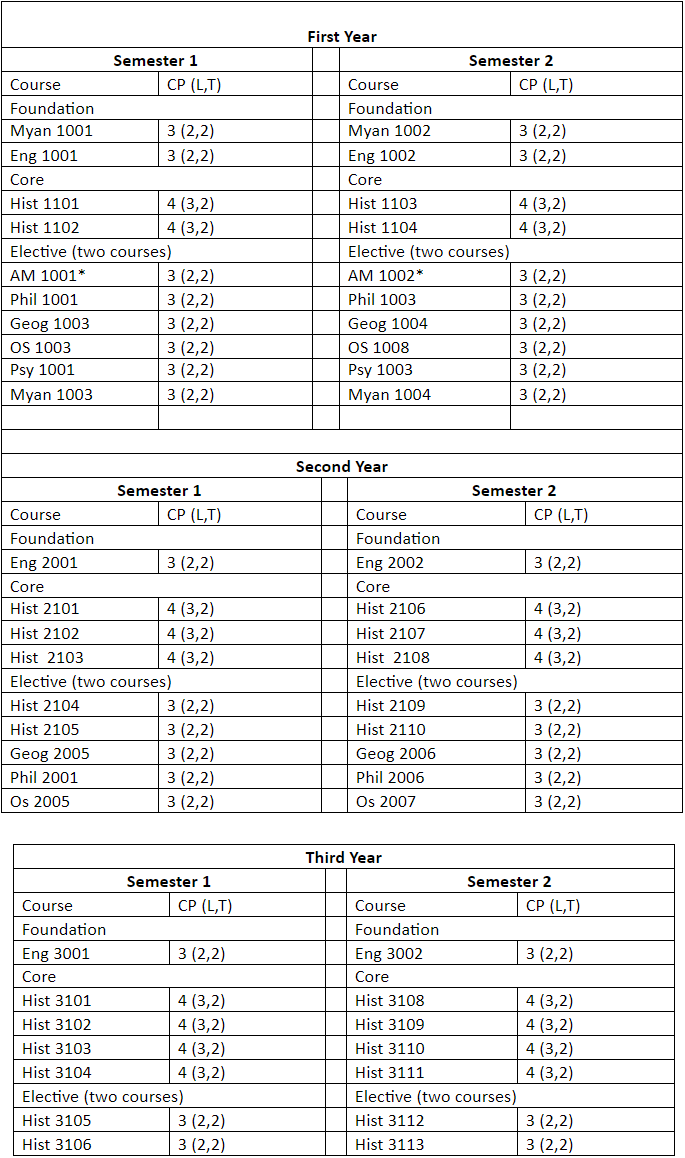
B.A. (Honours) in History
Students who passed second year with GPA ≥ 4 are eligible to attend B.A. (Honours) classes for three more years. After finished successfully, they are earned B.A. (Hons:) degree majoring in History.
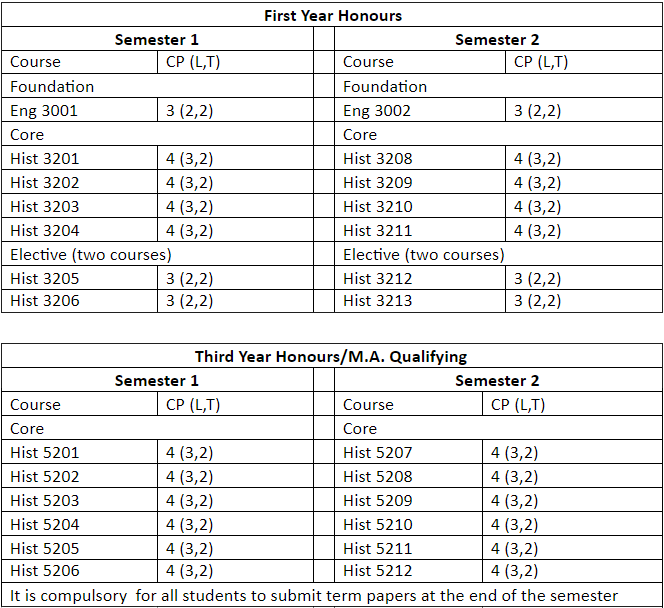
M.A. in History
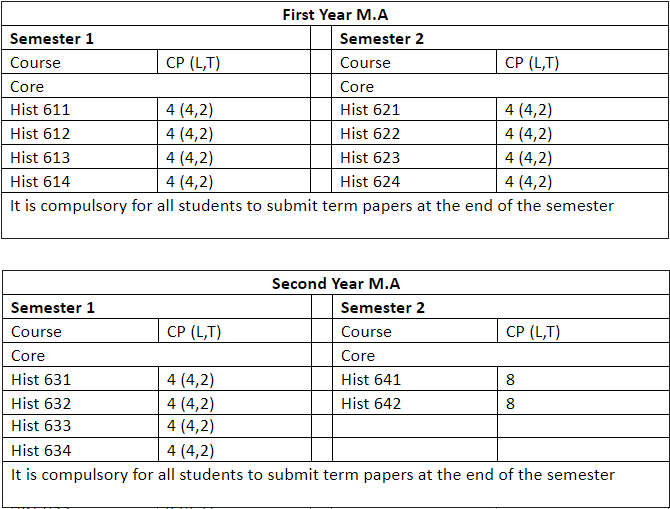
Course Descriptions
This course covers the evolution of Political Thoughts since the early days up to the modern time. It reveals the Nature of Political Ideas, the growth of Ancient Political Thoughts, arising the Roman Political Thoughts and then Medieval Political Thoughts. It also highlights the Beginning of Modern Political Thoughts of the West.
Expected Learning Outcomes (ELOs)
At the end of the semester, students will be able:
– to explore the nature of Political Ideas and theories throughout history, and
– to learn the complex political thoughts
This course covers World History from the Medieval Period up to the end of 19th century. It discloses the Beginning of Capitalist Society in the West, the Development of Early Capitalist Society in Europe, and the attempts of European countries to make Overseas Expansion to Asia, Africa and Latin America.
Expected Learning Outcomes (ELOs)
At the end of the semester, students will be able:
– to analyze the development of Capitalist Society in the West, and
– to explore the causes of Overseas Expansion of European Powers.
This course covers the gradual development of Myanmar Civilization since early days up to the Medieval time. It explains the features of Pyu, Rakhine and Mon Civilizations in the early days of monarchical period. It also reveals the gradual development of Myanmar Civilization with special references to Bagan, Innwa and Hanthawaddy Kingdoms.
Expected Learning Outcomes (ELOs)
At the end of the semester, students will be able:
– to examine the evolution of Myanmar Civilization since early time, and
– to distinguish the Civilizations of Pyu, Rakhine, Mon and Myanmar.
This course covers the history of Italian Renaissance (Revival of Thoughts and Cultures after the Dark Age) during 14th and 15th Centuries. It discloses the Beginning of Italian Renaissance, growth of Humanism developed by famous Italian scholars, impacts of Renaissance on the governmental system of Europe and the spread of Renaissance.
Expected Learning Outcomes (ELOs)
At the end of the semester, students will be able:
– to articulate the importance of Italian Renaissance in Western World, and
– to examine the roots of modern governmental system.
This course covers world history from ancient time up to the end of fiftieth century. It discloses the Beginning of Civilization, the growth of Indian, Chinese and Southeast Asian Civilizations from geographical, historical, political, social, cultural, administrative and religious aspects.
Expected Learning Outcomes (ELOs)
At the end of the semester, students will be able:
– to analyze the evolution of world history from ancient time up to the end of fiftieth century, and
– to distinguish among the characteristics of Indian, Chinese and Southeast Asian Civilizations.
This course covers World History from the Medieval Period up to the end of ninetieth century. It discloses the Beginning of Capitalist Society in the West, the Development of Early Capitalist Society in Europe, and the attempts of European countries to make Overseas Expansion to Asia, Africa and Latin America.
Expected Learning Outcomes (ELOs)
At the end of the semester, students will be able to
– to analyze the development of Capitalist Society in the West, and
– to be familiar with the reasons of Overseas Expansion of European Powers.
This course covers from the Prehistoric time to the end of Bagan Period. It reveals the Paleolithic, Mesolithic and Neolithic Cultures as well as Bronze Culture of Myanmar in the Prehistoric time. Then it discloses the Pyu, Early Rakhine and Early Mon Civilizations. It also explains the Bagan Period from historical, economic, social, administrative and cultural aspects.
Expected Learning Outcomes (ELOs)
At the end of the semester, students will be able:
– to familiarize the evolution of Myanmar nation from ancient time to the fall of Bagan, and
– to compare the Civilizations of Pyu, Rakhine, Mon and Myanmar.
This course covers the history of Ancient Southeast Asia from Prehistoric time up to the emergence of Early Kingdoms. It reveals the Paleolithic, Mesolithic, Neolithic and Bronze Culture of Southeast Asia. Then it explains the Spread of Chinese and Indian Cultures to Southeast Asia. It also discloses the emergence of Early Kingdoms such as Funan, Champa and Ayuthia. Lastly it explains the Spread of Islam to the region.
Expected Learning Outcomes (ELOs)
At the end of the semester, students will be able:
– to discuss the evolution of human beings in Southeast Asia and their ways to Civilization, and
– to distinguish among the influences of Chinese, Indian (Hinduism) and Islamic Cultures on Southeast Asia.
This course covers the big events in the world which occurred in the first half of twentieth century. It discloses the causes and effects of the First World War. Then it explains the emergence of Socialist Russia, the rise of Nazism and Fascism in Europe and Militarism in Asia. It also reveals the Nationalist Awakening of India and China as big events of this era.
Expected Learning Outcomes (ELOs)
At the end of the semester, students will be able:
– to criticize the causes and effects of the First World War, and
– to articulate the causes of the Second World War and the Nationalist Awakening of the East.
This course covers the fundamental concepts and theories of Political Organizations in the world. Firstly it reveals the Nature of the State and Sovereignty. Then it explains the Organization of the State and Constitution.
Expected Learning Outcomes (ELOs)
At the end of the semester, students will be able:
– to articulate the Nature of Political Organization in accordance with Internationally accepted definitions, and
– to classify the Forms of States, Governments and Constitutions.
This course covers the evolution of Science and Technology since the time of Ancient Civilization up to Italian Renaissance. It reveals the development of Science and Technology of Babylonians, Greeks and Romans. Then it discloses the development of Science and Technology of Chinese, Indians and Muslim World. It ends with the development of Science and Technology of the West in the time of Italian Renaissance.
Expected Learning Outcomes (ELOs)
At the end of the semester, students will be able:
– to examine the evolution of Science and Technology until the Medieval Period, and
– to interpret the meaning of the development of Science and Technology in historical context.
This course covers the Social History of England from the time of Chaucer to Shakespeare. Firstly it reveals the Community Structure of Chaucer’s England. Then it explains the Social Life of England under Tudor Dynasty. Finally it discloses the Community Structure and Social Relationship of Shakespeare’s’ England.
Expected Learning Outcomes (ELOs)
At the end of the semester, students will be able:
– to articulate the Community Structure of England until the time of Shakespeare, and
– to examine the Social Life and Relationship of English people at that time.
This course covers Myanmar History from Konbaung Period to the end of Colonial Period. Firstly it reveals the Politics of Konbaung Period and its Administrative, Economic, Social and Cultural aspects. Then it discloses the loss of Independence and the struggle for Independence of Myanmar people. It ends with regaining Independence after the end of Second World War.
Expected Learning Outcomes (ELOs)
At the end of the semester, students will be able:
– to examine the Myanmar History from the time of Konbaung until the end of Colonial Period, and
– to analyze the struggle of Myanmar people during the Colonial era.
This course covers the History of Southeast Asia under Colonialism. It reveals the Economic, Social and Administrative situations of Southeast Asia under Colonial Rule. It also explains the Nationalist Movements of Southeast Asian Nations during the Colonial Period.
Expected Learning Outcomes (ELOs)
At the end of the semester, students will be able :
– to discuss the general conditions of Southeast Asia under Colonial Rule, and
– to compare the Nationalist Struggles of Southeast Asian Nations with each other.
This course covers the History of China from the time of Sun-Yet-Sen up to Mao-Ze-Dang. Firstly it discloses the 1911 Revolution and its impacts on China. Then it reveals the National Awakening of Chinese after the First World War. It also explains the the Rise of Chinese Communist Party and the establishment of the People’s Republic of China. Finally it ends with the struggle for development of China by Mao-Ze-Dang and Dang-Xiao-Ping.
Expected Learning Outcomes (ELOs)
At the end of the semester, students will be able:
– to analyze the ways of China to development in twentieth century, and
– to sketch the struggle of Chinese for their country’s development.
This course covers the History of Russia from the fall of Tzar to Putin. Firstly it reveals the 1917 Revolution and the establishment of Soviet Union as the first Communist Country in the World. Then it explains the involvement of Soviet Union in the Second World War and its attempts for Postwar Reconstruction. It also discloses the Reformation of Gorbachev and the Collapse of Soviet Empire. It ends with the emergence of Russian Federation.
Expected Learning Outcomes (ELOs)
At the end of the semester, students will be:
– to discuss the rise and fall of Soviet Union, and
– to analyze the role of Russian Federation in new global order.
This course covers the History of India from the time of Mughal Empire up to the early Colonial Period. Firstly it discloses the Disintegration of Mughal Empire and the Establishment of British Colonial Rule. Then it explains the Economic and Social Changes under Colonial Administration. Finally it ends with the armed uprising and early nationalist movement of Indians against British Colonial Rule.
Expected Learning Outcomes (ELOs)
At the end of the semester, students will be able:
– to articulate the fall of Mughal Empire and the Rise of Colonial Empire in South Asia, and
– to analyze the early nationalist movement of Indians against Colonialism.
This course covers the Economic and Social History of Modern Southeast Asia under Colonialism. It firstly reveals the Economy of SEA under Colonialism and then Social Changes under alien rulers. It ends with the Economic and Social Changes of SEA before the outbreak of Second World War.
Expected Learning Outcomes (ELOs)
At the end of the semester, students will be able:
– to criticize the drastic changes of Economy and Society of SEA under Colonial Rule, and
– to analyze the losses and gains of SEA countries in Economic and Social aspects under Colonialism.
This course covers the gradual development of Myanmar Historical Writings during the monarchical period. It discloses the Background History of Myanmar Historical Writings, brief history of Myanmar Historical Chronicles called Yazawin at national level and local level.
Expected Learning Outcomes
At the end of the semester, students will be able:
– to justify the evolution of Myanmar Historical Writings during monarchical period and
– to criticize the quality of Myanmar Historiography at national and local context.
This course covers the general evolution of Myanmar Historical Literature in monarchical period. It discloses the Writing Materials which were used in Myanmar Historical Literature, Documents dealing with the Court Ceremonies, and title and office offering occasions.
Expected Learning Outcomes (ELOs)
At the end of the semester, students will be able:
– to explain the gradual growth of Myanmar Historical Literature,
– to analyze the Documents related to the Court Ceremonies, and
– to apply those Documents in writing his/her research works.
This course covers the period since1945 up to the end of twentieth century. It reveals the Political Problems of Post-Independence Southeast Asian nations, impacts of Cold War on those nations and interaction among them.
Expected Learning Outcomes
At the end of the semester, students will be able:
– to analyze the political trend of post-independence Southeast Asia, and
– to articulate the attitudes of Southeast Asian nations to each other and interaction among them during the second half of twentieth century.
This course covers the history of Middle East during the first half of twentieth century. It discloses the Collapse of Ottoman Turkey Empire, impacts of the First World War on Middle East, the general situations of those nations in the Inter-War period, and the invovlement of Middle East in the Second World War.
Expected Learning Outcomes
At the end of the semester, students will be able:
– to justify the role of Middle East in global political order, and
– to examine the importance of Middle East in world power politics.
This course covers the period since 1945 up to the end of twentieth century. It reveals the decline of European Powers after the Second World War, the rise of American and Soviet as Super Powers, and the outbreak of Cold War between them. It encloses the role of United Nations as a peace keeping body in International politics. It also explains the reaction of Third World Countries to the above mentioned global order.
Expected Learning Outcomes
At the end of the semester, students will be able:
– to analyze the International political order based on the relations of Two Super Powers, and
– to illustrate the impacts of Cold War on the Third World Countries.


